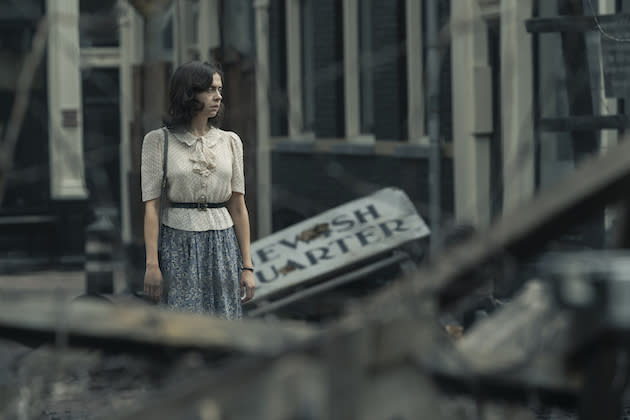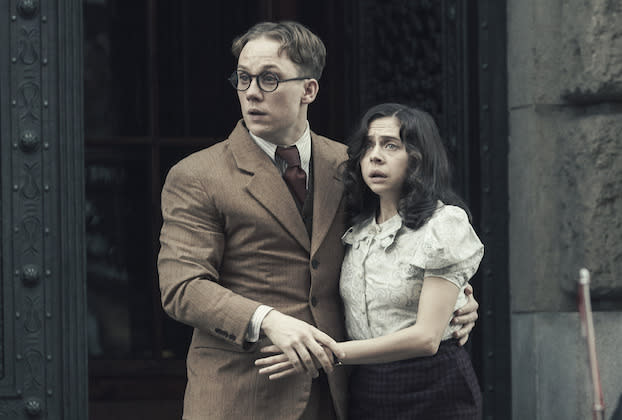A Small Light Finale: Bel Powley on Being 'Blown Away' While Shooting That Diary Scene With Liev Schreiber

Many of us know the tragic ending to Anne Frank‘s story, and that ending certainly plays out in Monday’s A Small Light finale. But the closing of National Geographic’s limited series also sheds light on what’s not as well known: what happened after World War II to Anne’s father, Frank, and the people who hid him and his family from the Nazis.
The two episodes that finish the series deal with the horror of the capture of the Frank and Van Pels families and Dr. Pfeffer. But they also highlight the bravery of Miep and Jan Gies in the aftermath of that atrocity, and the way that Otto’s bond with the Gies family fortified him in the face of such unimaginable loss.
TVLine checked in with Bel Powley (The Morning Show), who plays Miep, to talk about what it was like making that moving finale. Read on to hear her thoughts.
TVLINE | We’ll get to the events of the finale in a moment, but I have to tell you: I’ve been so taken with the way this story has such a female focus, how things like procuring food for everyone in the annex was nearly a full-time job. I feel like we don’t always get that perspective.
Absolutely. And, just on a larger note, that this period of history, obviously, has been explored a lot in film and television, and it’s almost always explored through the male gaze. I can’t tell you how many films and TV shows I’ve seen about men at war, which, I know people love them, but I’m a bit over it. [Laughs] There were so many incredible, heroic women during this time who, yeah, they might not have been on the frontline and in the trenches, but they were doing really amazing things like Miep was.
TVLINE
| Now that we’re at the end of the series, talk to me about how you think this experience changed Miep.
I think, in that way, this show could also be seen as a coming-of-age story. You know, when we meet this young woman, she is very relatable. I think anyone who’s been in their early 20s, or who is in their early 20s, can relate to, like, partying too much and falling in love for the first time and feeling a bit directionless and not knowing what you’re going to do with your life.
And over the course of eight episodes, yeah, we span some time, but also, a lot changes within this young woman who, without hesitation, said yes to her boss because she knew that was the right thing to do. I think things change in her relationship with her husband and her relationship with the Franks, relationship with Otto. But also, you know, her relationship with herself. She probably, like, realizes she had strength that she never knew that she had before.
TVLINE | It seems like all of the hard stuff in her past could embitter her, but she never comes across that way in your portrayal. As we see, she has hope for Margot and Anne’s survival way past the point that most people did, right?
Yeah. But I do think that, I mean, if it was me, I would have hope, too. Imagine being in that situation. She probably couldn’t bear to even go there, to think about what could’ve happened to them. It had to be in her head like, “No, they’re going to be OK. They’re strong, and you know, some people…we saw Otto come back.”
Since the moment they went into the annex and Amsterdam came under the occupation, everyone had to live with hope. Otherwise, everything would just fall apart, even more than it already had. I don’t know. I don’t know where she gets it from. I think maybe it was her childhood… being sent away as a kid and being starving.
I think maybe seeing the selflessness of her birth mother sending her daughter away to another family to save her life, and then the selflessness of the family who adopted her, who already had other kids — I think growing up with that kindness around, it probably infuses into you. But it also gives you an incredibly thick skin and a sense of independence and bravery.
TVLINE
| Speaking of bravery: It must’ve taken so much for her to march into the Nazi headquarters to try to buy freedom for everyone taken from the annex.
Yeah. She just had this, like, unwavering sense of what’s right and what’s wrong. I mean, we can all learn from it… Her moral compass was, so, so strong, and that’s why, like, without hesitation, she said, yes, of course I will help you. Without hesitation, she said, I’m going to go into the Gestapo headquarters and try and get them back.
TVLINE | Talk to me about shooting that scene. The Nazi iconography is horribly striking. As a Jewish woman in that situation, what was your reaction when you stepped onto that set?
It was freaky. And you know what? Fun fact. That set was the actual Gestapo headquarters in Prague where we were filming.
TVLINE | What?!
Yeah. I know. It was mad. Yeah. It was horrible, and it was scary. I have to say, by that point in the filming process, we’d already probably been going for, like, four months. We’d definitely gotten pretty used to seeing Nazis on set, and you know, you get used to the world that you’re living in every day and the narrative that we’re telling. But yeah, it was freaky.
Daniel [Donskoy], who plays the Nazi officer who arrested them all and to whom she goes to make her plea to at the Gestapo headquarters, I think he played it so brilliantly… He was a good scene partner, and yeah, it worked.
TVLINE | Prior to the show, I hadn’t really understood the friendship that Miep and Otto had. When I spoke with [showrunner] Joan Rater, she pointed out how close they must’ve been, for Otto to choose to live with her and Jan for years after the war.
There are so many things that made Miep a very modern woman for the time, and I think that’s one of them. I truly read it as and played it as they’re best friends, like, best mates. And for a young woman to have that kind of friendship with a man 20 years her senior in the ’40s is unheard of and is incredibly contemporary, and I thought there’s something really interesting about that. It definitely wasn’t hard to play that out with Live [Schreiber], who I adore.
TVLINE | Talk to me about filming that scene in the finale where he’s sitting in her living room and thanking her for saving the diary.
Oh my god, yeah. He was so good in that scene. It was all very organic, and that really is how Liev and I worked together for the entire series. We were never married to one way of playing the scene, and we really explored and played together, which I think is what makes those scenes work so well…
I had no idea how he was going to play it. He was off-set. He was outside, and we didn’t really talk at all until they called action and he came into the room. I was blown away by his performance, but also, the fact that there was no kind of anticipation to how he was going to play it made it feel, obviously, all the more real. It made it all the more emotional for everyone I think. Yeah, I think it was really beautiful.
Now it’s your turn. Grade the finale, and the series as a whole, via the polls below. Then hit the comments with your thoughts!


